The foreign relations of South Africa have spanned from the country's time as a dominion of the British Empire to its isolationist policies under apartheid to its position as a responsible international actor taking a key role in Africa, particularly southern Africa. South Africa is a member of the United Nations, the African Union and the Commonwealth of Nations. Considered a possible permanent addition to the United Nations Security Council, South Africa was elected in 2006, 2010 and 2018 by the UN General Assembly to serve on the Security Council. South African President Cyril Ramaphosa was the chair of the African Union from 2020 to 2021, the second time South Africa has chaired the organisation since its formation in 2003.

A think tank, or public policy institute, is a research institute that performs research and advocacy concerning topics such as social policy, political strategy, economics, military, technology, and culture. Most think tanks are non-governmental organizations, but some are semi-autonomous agencies within a government, and some are associated with particular political parties, businesses, or the military. Think tanks are often funded by individual donations, with many also accepting government grants.

Foreign policy, also known as external policy, is the set of strategies and actions a state employs in its interactions with other states, unions, and international entities. It encompasses a wide range of objectives, including defense and security, economic benefits, and humanitarian assistance. The formulation of foreign policy is influenced by various factors such as domestic considerations, the behavior of other states, and geopolitical strategies. Historically, the practice of foreign policy has evolved from managing short-term crises to addressing long-term international relations, with diplomatic corps playing a crucial role in its development.

The Royal Institute of International Affairs, commonly known as Chatham House, is a British think tank based in London, England. Its stated mission is "to help governments and societies build a sustainably secure, prosperous, and just world". It is the originator of the Chatham House Rule.
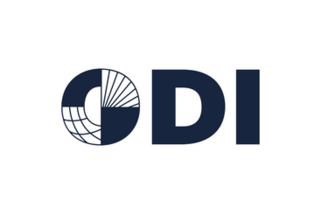
Overseas Development Institute (ODI) is a global affairs think tank, founded in 1960. Its mission is "to inspire people to act on injustice and inequality through collaborative research and ideas that matter for people and the planet." It does this through "research, convening and influencing, to lead new thinking and future agendas to deliver transformational change." Its chair is Suma Chakrabarti.

Moscow State Institute of International Relations (MGIMO) is an institute of higher education located in Moscow, Russia. The institute is run by the Russian Ministry of Foreign Affairs.
The German Institute of Development and Sustainability (IDOS) is one of the leading think tanks for development policy worldwide. The institute is based in Bonn, Germany.
Turkish think tanks are relatively new, but such think tanks provide research and ideas, yet they play less important roles in policy-making when compared with American think tanks. Many of them are sister organizations of a political party or a company. There are very few university think tanks.
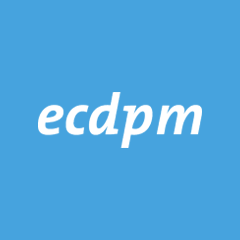
The European Centre for Development Policy Management, more commonly known as ECDPM, is a think tank founded in 1986. It is headquartered in Maastricht, Netherlands and has a second office in Brussels, Belgium.
The Institute for International Political Studies, founded in 1934, is the oldest Italian think tank specialised in international affairs. ISPI approaches international affairs in a sound pragmatic manner, monitoring geopolitical areas as well as major global trends. Comprehensive interdisciplinary analysis is ensured by close collaboration with specialists, academic and non-academic, in political, economic, legal, historical and strategic studies and an ever-growing network of think tanks, research centers and universities in Europe and abroad. Its headquarters are in Palazzo Clerici, a splendid example of 18th-century Milanese patrician building which boasts among its treasures the famous room with a Tiepolo fresco.

John James Kirton is professor emeritus of political science and the director and founder of the G7 Research Group, director and founder of the G20 Research Group, founder and co-director of the Global Health Diplomacy Program, and founder and co-founder of the BRICS Research Group, based at University of Trinity College in the University of Toronto.
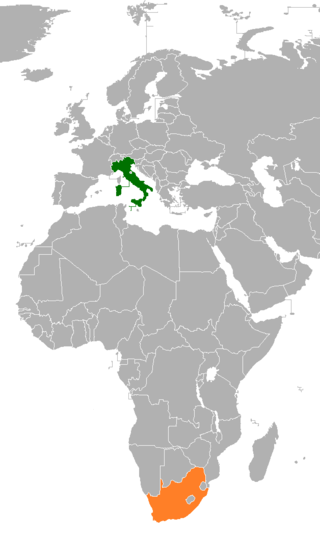
Italy–South Africa relations are the bilateral relations between Italy and South Africa. Both countries established diplomatic relations in 1929. Italy has an embassy in Pretoria, a consulate-general in Johannesburg and a consulate in Cape Town. South Africa has an embassy in Rome. Both countries are members of the G20.
The Lakshman Kadirgamar Institute of International Relations and Strategic Studies (LKI) is a foreign policy think tank currently based in Colombo, Sri Lanka. The Minister of Foreign Affairs of Sri Lanka is ex officio the Chairman of LKI. LKI conducts independent research and functions as an autonomous organisation. LKI was established in 2006 and is named after the late Sri Lankabhimanya Lakshman Kadirgamar, PC, MP, and former Sri Lankan Foreign Minister. The Institute is the realisation of a goal actively pursued by the late Minister, to fulfill the country's need for a think tank in the field of foreign policy research and engagement. Its stated mission is 'to engage in independent research of Sri Lanka’s international relations and strategic interests, and to provide insights and recommendations that advance justice, peace, prosperity and sustainability.'
LSE IDEAS is a foreign policy think tank at the London School of Economics and Political Science. IDEAS was founded as a think tank for Diplomacy and Strategy in February 2008, succeeding the Cold War Studies Centre founded in 2004. It is led by Professor Christopher Alden and Professor Michael Cox. LSE IDEAS has been ranked as the top European university-affiliated think tank and the number two university-affiliated think tank in the world.
The FRIDE was an independent European think tank headquartered in Madrid and Brussels. As of 2012, it was one of 55 think tanks in the country. It focused on the improvement of European views and ideas on various topics related to international development. It ceased its activities on 31 December 2015 due to lack of funding.
The Institute for Security Studies, also known as ISS or ISS Africa, described itself as follows: "an African organisation which aims to enhance human security on the continent. It does independent and authoritative research, provides expert policy analysis and advice, and delivers practical training and technical assistance." Their areas of research include transnational crimes, migration, maritime security, development, peacekeeping, peacebuilding, crime prevention, criminal justice, conflict analysis and governance. It is the largest independent research institute in Africa dealing with human security and is headquartered in Pretoria, South Africa, with offices in Kenya, Ethiopia and Senegal. In 2019, it was ranked 116th by the Global Go To Think Tanks Report and 55th among think tanks outside the United States.
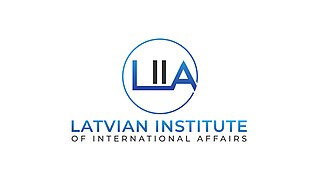
The Latvian Institute of International Affairs is an oldest research center and think tank in Latvia. Founded on May 20, 1992, the organization seeks to provide “Latvia's decision-makers, experts, and the wider public with analysis, recommendations, and information about international developments, regional security issues, and foreign policy strategy and choices.” The Institute develops and publishes research, organises high-level international conferences and promotes cooperation with Latvian and foreign research institutions. The LIIA is a nonprofit and does not receive regular government funding. LIIA’s funding is project-based. Its projects are funded through close cooperation with a range of other organisations and foundations, both Latvian and foreign. The Institute implements international cooperation projects within the European Commission's Horizon Europe and Erasmus+ programs. International projects are also funded by such recognisable supporters as the National Endowment for Democracy, Freedom House, the German Marshall Fund of the United States, the Nordic Council of Ministers, the Konrad Adenauer Stiftung, EEA and Norway Grants. LIIA’s research focuses on important topics such as Latvian foreign policy; transatlantic relations; security issues in the Baltic Sea region; European Union policies, including its neighborhood policy and Eastern Partnership; and multilateral and bilateral relations with Russia.
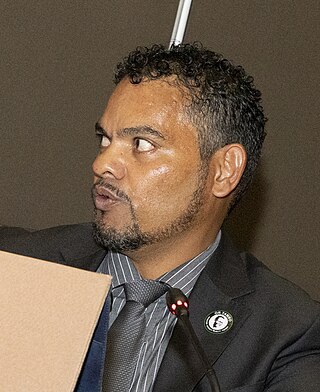
Alvin Botes is a South African African National Congress (ANC) politician from the Northern Cape who has been serving as the Deputy Minister of International Relations and Cooperation since May 2019. He became a Member of the National Assembly of South Africa in February 2018.










